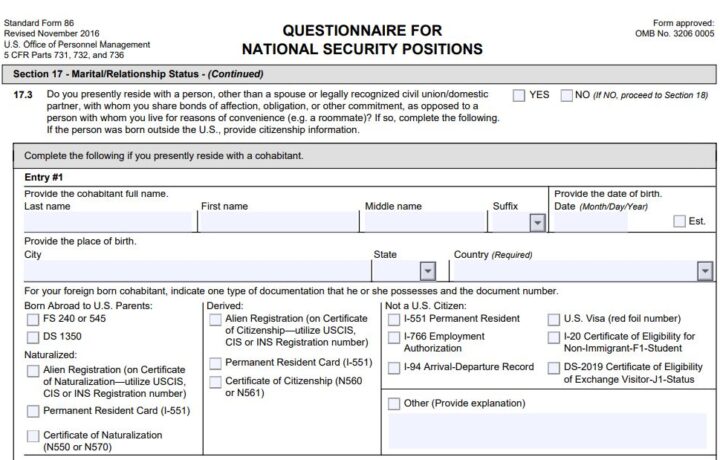The security clearance application, officially known as the “Questionnaire for National Security Positions,” is a document used by the United States government to conduct background checks for individuals seeking security clearances. The information contained in an SF-86 form is highly sensitive and is protected by privacy regulations.
One ClearanceJobsBlog.com subsubscriber asks:
What can an FSO share with other departments like HR? I took a glance at some federal laws like the NIPSOM. See part d of 32 CFR § 117.10 – Determination of eligibility for access to classified information for contractor employees. | Electronic Code of Federal Regulations (e-CFR) | US Law | LII / Legal Information Institute 2 “Not share information from the employee’s SF 86 within the entity and will not use the information for any purpose other than determining the adequacy and completeness of the SF 86.” Can anyone verify this? Do FSOs just review for accuracy and completeness?
As for the Facility Security Officer (FSO), they have responsibilities in managing security clearances within a company. However, they are bound by strict confidentiality and privacy rules regarding the information they handle. Generally, FSOs cannot disclose information from an SF-86 form to anyone else in the company unless there is a specific, authorized need to know. This means that the information can only be shared with individuals who are authorized and have a legitimate reason to access it, usually for security-related purposes.
William Henderson, ClearanceJobs contributor notes, “32 CFR 117 only applies to contractors. It does not apply to military or federal civilians. Yes, contractor FSOs are prohibited from sharing information from an SF86 with others in the company. However, what if it’s a very small company where the HR manager is also the FSO?”
Unauthorized sharing of this information could lead to legal consequences and compromise the integrity of the security clearance process. But if you’re concerned that what you share on the security clearance application could cause issues for you with HR, you may need to inquire with a security clearance attorney or consultant for more advise on your specific situation. While information generally doesn’t, and shouldn’t, cross the threshold between security and HR, there are situations where it’s a possibility. If that prospect makes you nervous due to issues you disclose on the application but haven’t to HR, or even worse, due to fabrications in your application that could come up if disclosed to HR, there are more serious factors in play.
This question was posed from a subscriber at ClearanceJobsBlog.com, where you can read and discuss government security clearance process, how to get a security clearance job, and background investigations issues.
Much about the clearance process resembles the Pirate’s Code: “more what you’d call guidelines than actual rules.” This case-by-case system is meant to consider the whole person, increase process security, and allow the lowest-risk/highest-need candidates to complete the process. This article is intended as general information only and should not be construed as legal advice. Consult an attorney regarding your specific situation.



